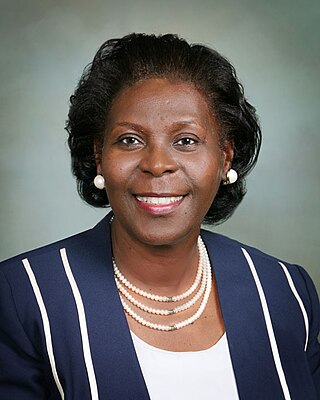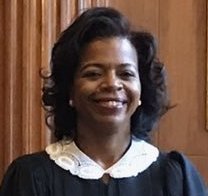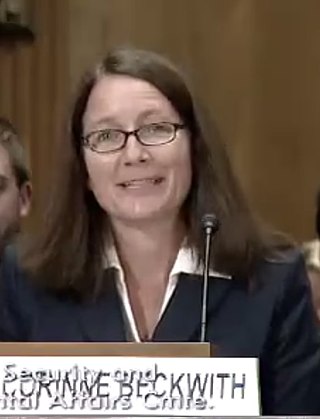Related Research Articles

Sarah Elizabeth Parker is an American judge who served as the chief justice of the North Carolina Supreme Court from February 2006 until August 2014.

The North Carolina Court of Appeals is the only intermediate appellate court in the state of North Carolina. It is composed of fifteen members who sit in rotating panels of three. The Court of Appeals was created by the North Carolina General Assembly in 1967 after voters approved a constitutional amendment in 1965 which "authorized the creation of an intermediate court of appeals to relieve pressure on the North Carolina Supreme Court."
Linda M. McGee is an American judge, who retired as the Chief Judge of the North Carolina Court of Appeals at the end of 2020. McGee retired as the "longest serving Court of Appeals judge in state history."

Patricia Ann "Pat" Timmons-Goodson is an American judge and politician who served on the North Carolina Supreme Court from 2006 to 2012. She previously served on the United States Commission on Civil Rights and is a former nominee to be a federal judge for the United States District Court for the Eastern District of North Carolina. Timmons-Goodson ran for Congress in 2020.
Wanda G. Bryant is an American judge, who retired as an associate judge on the North Carolina Court of Appeals at the end of 2020.
Martha A. Geer is an American attorney and jurist who served as a judge of the North Carolina Court of Appeals.

Pasco Middleton Bowman II is an American attorney and jurist serving as a senior United States circuit judge of the United States Court of Appeals for the Eighth Circuit.

Barbara Louise Milano Keenan is a senior United States circuit judge of United States Court of Appeals for the Fourth Circuit and a former justice on the Supreme Court of Virginia.
Calabria is a region located in Italy. It may also refer to:

Cheri Lynn Beasley is an American attorney and jurist who served as the chief justice of the North Carolina Supreme Court from 2019 to 2020; she was appointed an associate justice in 2012. Beasley previously served on the North Carolina Court of Appeals and as a district court judge in Cumberland County, North Carolina.

Johnnie Mae Blakeney Rawlinson is a United States circuit judge of the United States Court of Appeals for the Ninth Circuit and a former United States district judge of the United States District Court for the District of Nevada.

One justice of the North Carolina Supreme Court and five judges of the North Carolina Court of Appeals were elected by North Carolina voters on November 2, 2010, on the same day as the U.S. Senate election, U.S. House elections, and other state-level elections. North Carolina judicial elections are non-partisan. Terms for seats on each court are eight years. All incumbent judges and justices who sought re-election won their respective races, except for Judge Cressie Thigpen of the Court of Appeals, who had been appointed shortly before the election and lost North Carolina's first statewide election to use Instant-runoff voting.

Eric Lee Clay is a United States circuit judge of the United States Court of Appeals for the Sixth Circuit.

Albert Diaz is the chief United States circuit judge of the United States Court of Appeals for the Fourth Circuit. Diaz is the first Hispanic judge to serve on the Fourth Circuit. Prior to his appointment to the Court of Appeals, Diaz was a North Carolina state superior court judge and an appellate judge for the Navy-Marine Corps Court of Criminal Appeals.

Several justices of the North Carolina Supreme Court and judges of the North Carolina Court of Appeals were elected to eight-year terms by North Carolina voters on November 5, 2002. Party primary elections were held on Sept. 10. This was the last year in which statewide judicial elections were partisan.

Julianna Michelle Childs is an American lawyer and jurist serving as a United States circuit judge of the United States Court of Appeals for the District of Columbia Circuit. She was previously a United States district judge of the United States District Court for the District of South Carolina from 2010 to 2022 and a judge of the South Carolina Circuit Court from 2006 to 2010.

Catherine Diane Caldwell Eagles is the Chief United States district judge of the United States District Court for the Middle District of North Carolina and a former Superior Court judge in Guilford County, North Carolina. She is the first female judge to serve in the Middle District.

Robert Christopher "Chris" Dillon is a North Carolina attorney and judge of the North Carolina Court of Appeals. Dillon won election to the appellate court in a statewide race on Nov. 6, 2012, when he defeated incumbent Cressie Thigpen. Dillon won re-election on Nov. 3, 2020 over challenger Gray Styers.

Corinne Ann Beckwith is an associate judge of the District of Columbia Court of Appeals, the highest appellate court for the District of Columbia. She spent her legal career as a public defender before being nominated to the bench by President Barack Obama in 2011.

One justice of the seven-member North Carolina Supreme Court and three judges of the 15-member North Carolina Court of Appeals were elected by North Carolina voters on November 6, 2018, concurrently with other state elections. Terms for seats on each court are eight years. These elections were partisan for the first time since the elections of 2002. A law passed by the North Carolina General Assembly in 2017 cancelled primary elections for judicial elections in 2018 only, meaning that an unlimited number of candidates from any party could run in the general election.
References
- ↑ "Judges Ann Marie Calabria and Richard A. Elmore Retire after More Than 15 Years of Service to the North Carolina Court of Appeals | North Carolina Judicial Branch". www.nccourts.gov. Retrieved June 7, 2019.